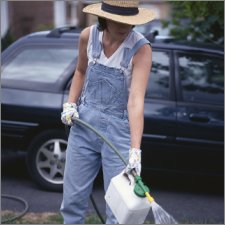Why Babies Conceived in Summer
Don't Do as Well in School
by www.SixWise.com
If you're thinking of having a child, you may want to wait until the fall, particularly if you want your child to be a whiz kid in the classroom.
|

The consequences of babies being exposed to environmental toxins, both before and after birth, may not be revealed for decades. |
As it turns out, kids who were conceived in June, July or August have, on average, test scores for math and language that are 1 percent to 1.5 percent lower than scores of kids who were conceived during other months.
The correlation, according to Dr. Paul Winchester, a neonatologist at the Indiana University School of Medicine and director of the Neonatal Intensive Care Unit at St. Francis Hospital in Indianapolis, has to do with a ubiquitous toxin that some of us even use in our own homes: pesticides.
Summer Means Pesticide Use is at its Highest
More than 1 billion pounds of pesticides are used every year in the United States, and usage peaks in the summer months. According to Winchester, these environmental toxins are not simply disappearing into the air and ground; they're contaminating our food and drinking water, and affecting the minds of future generations.
"The fetal brain begins developing soon after conception. The pesticides we use to control pests in fields and our homes and the nitrates we use to fertilize crops and even our lawns are at their highest level in the summer," Winchester said.
"We have now linked higher pesticide and nitrate exposure in surface water with lower cognitive scores," he says. "Neurodevelopmental consequences of exposure to pesticides and nitrates may not be obvious for many decades."
Aside from lower test scores, Winchester says that birth defects are also more common between April and July, as are premature births.
Why Pesticides are Risky for Children, Pregnant Women
Babies and children are at the highest risk of being harmed by pesticides, according to the Environmental Protection Agency, because:
-
Their internal organs are still developing and maturing
-
In relation to their body weight, infants and children eat and drink more than adults, possibly increasing their exposure to pesticides in food and water
-
Certain behaviors -- such as playing on floors or lawns or putting objects in their mouths -- increase a child's exposure to pesticides used in homes and yards
Unborn babies are also at risk if their mother is exposed to pesticides via food, water, or the environment.
|

If you want to reduce your exposure to pesticides, avoid using chemical pesticides in your home and yard, and never apply pesticides anywhere if you're pregnant. |
Aside from increasing the risk of a host of birth defects, including oral clefts, neural tube defects, heart defects, and limb defects, the EPA says that pesticides can harm children by:
How to Avoid Pesticide Exposure, for You and Your Children
Pesticides are so pervasive in our environment that it takes a conscious effort to lower your exposure. You can keep yours and your family's to a minimum by:
-
Keeping your home, yard and surroundings free from pesticides, insecticides and other similar chemicals (choose chemical-free varieties, like the completely non-toxic Flea 'n Tick B Gone, instead).
-
Eating organic foods (they don't contain pesticides), including organic meats, dairy products, and eggs.
|
Wash Dem Veggies!
Safely remove toxic pesticides, dirt, mold and other residues from your family's produce with Vermont Soap Organics' Wash Dem Veggies. This unique fruit and vegetable wash:
- Makes foods taste better
- All Organic-Soap based
- All-natural ingredients
- Healthy, non-toxic alternative
- Absolutely NO artificial colors, fragrances and preservatives
- Available in 16oz or Economical Gallon Size
- No Animal Testing
- No Animal Products or By-Products
Find out More and Order Wash Dem Veggies Fruit and Vegetable Wash Now! |
-
Washing all of your produce, organic or conventional, with Wash Dem Veggies, a natural soap-based wash that will eliminate all the dangerous residues from your family's foods.
-
Avoiding exposure to community-wide pesticides, such as those used in mosquito fogging or farming.
-
Filtering your tap water to keep out any pesticides or similar chemicals it may contain.
Recommended Reading
Popular Preterm Labor Drug Terbutaline Can Expose Brain to Pesticide Injury
Does Early Exposure to Food Allergens Increase Tolerance to Them?
U.S. EPA Pesticides: Health and Safety
FoxNews.com May 9, 2007